#nanowrimo prompts
Text
free resources to write a novel in 2024
hello hello! it's me, rach!
as the new year approaches, many of us set goals and resolutions - myself included. one of my goals for 2024 is to write a novel (I've been procrastinating on this for quite a long time now). i assume that some of you might have the same goal, that's why I'm writing this post today.
over 2023 i've been releasing some freebies for authors just like me, so I thought I could compile my favorites in this post. hope you find this useful :)
1) the writer's workbook
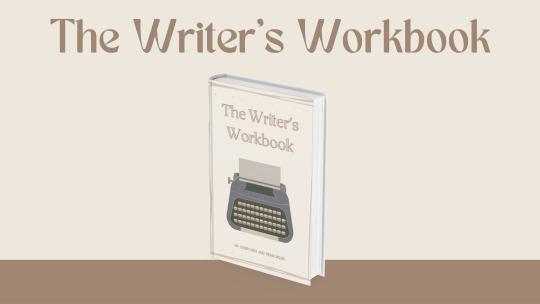
this workbook has over 60 exercises to help you develop characters, scenarios, etc. if you're ever stuck, I'm pretty sure this workbook will be your best friend.
2) author's corner (notion template)
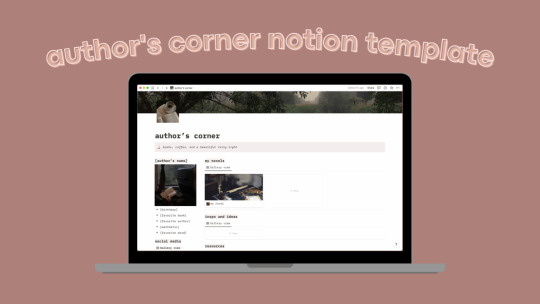
this is the most downloaded freebie in my shop! it is a notion dashboard with everything you need to organize your writing and has some templates included (like scrivener)!!
3) another notion template
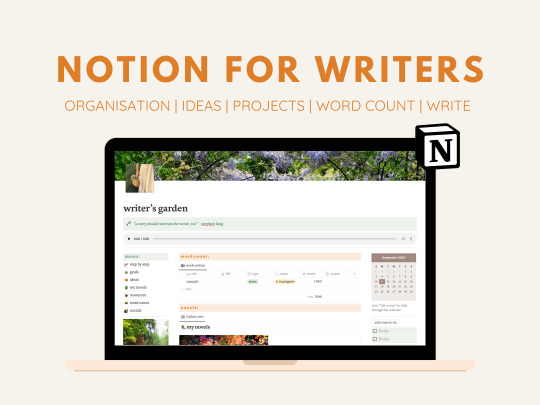
this one has two themes you can choose from: cottage-core and dark academia. they're very similar to the previous template, but this one is more recent and I added some new features. feel free to explore both and pick the one you like the most.
4) the author's journal
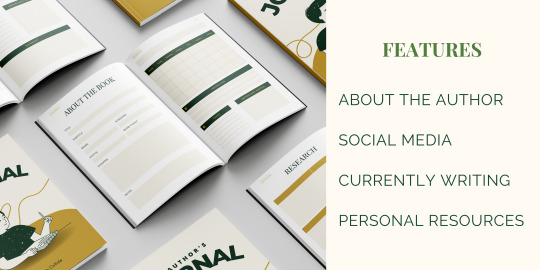
this is a cute printable with 20 pages that will help you stay on track and manage your social media accounts as a writer who shares their work online. you can also register what you're currently writing and your personal research and resources.
5) plan your book printable
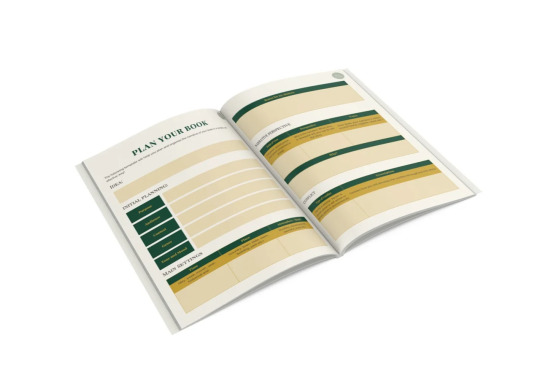
this is a 6-page printable for you to fill out and plan your book easily and effectively.
6) excel sheet to organize tasks & word-count

this is a simple excel sheet, but it is very effective for keeping track of your tasks & word-count of your novels. also, it is 100% customizable to your liking!
that's all for now! feel free to explore my gumroad shop where I have plenty of freebies to grab! also, don't forget to subscribe so that you never miss any opportunity to get a goodie for free :)
hope this post was useful!
have a nice day,
rach
#writing resources#writing#writeblr#writer tips#writing advice#writing help#writing tips#poetsandwriters#resources#research#wattpad#nanowrimo#creative writing#writerscommunity#writers#writing inspiration#writing prompts#writing reference#writerslife#writersofinstagram#software#inspiration#writing inspo#for writing#for writers#for whoever needs it#writing research#researching#we love an useful post#useful
3K notes
·
View notes
Text
#today on tumblr#nanowrimo#writers of tumblr#writblr#nano 2023#nanowrimo 2023#national novel writing month#nanowrimo prep#nanowrimo tips#writerblr#writing community#writing prompt#writing inspiration#my writing#writing tips#creative writing#writeblr#writers on tumblr#writer
910 notes
·
View notes
Text
how to write relatable characters
writing relatable characters may seem like an easy task, especially when you’re constructing your protagonist. but what if you want to make your antagonist likeable? what if you want people to hate your protagonist but still root for them? all of this and more requires that your characters be relatable. they need to feel real, so how do you do that? here’s how:
- flaws: this is probably obvious. everyone has flaws, so we should give our characters flaws, too. this applies even if your character is non-human; they cannot escape the personification that we as writers or readers project onto them. we are humans reading, so we expect to see human qualities everywhere we look. if you’re having trouble of identifying your character’s flaws, here are some prompts for ways to think about flaws beyond a list:
what skills do they lack? what do they struggle with?
can their strengths be turned against them as a weakness?
what makes them react emotionally or impulsively?
are they aware of their flaws? if so, do they want to improve them or change them?
- quirks: these are what make your character unique or special, and no, i don’t mean purple eyes or unique physical traits. i mean: what makes your character authentically themselves? what traits define them that few others have? some ways to think about this are:
how do they react when nervous? do they have a tell? similarly, how do they react on behalf of any emotion?
what skills do they have that hardly anyone else has?
what obscure thing are they obsessed with?
do they have a unique outlook on life compared to their peers?
- values: these come from life experiences: where we were raised, our family and friends, our community, religious affiliations, etc. i suggest identifying eight to ten values that define your character and then narrowing that list down to five values that mark their core or essence. think about how these values influence their choices, decisions, and ultimately, the plot of the novel. here are some more prompts to think about values:
how do they react when their values are challenged? are they one to speak up or do they sit back in the shadows?
what, if anything, will change or shatter their values?
are their actual values misaligned with their believed values?
- stakes: what is at risk for your character? what is motivating them? stakes don’t need to be over the top or life or death; they can be as simple as maintaining a relationship or reaching a goal. unless there’s an outside influence (ie. percy’s mother being kidnapped in The Lightning Thief), most stakes—especially those relatable—tie back to values. even those influenced by outside factors can tie back to values: the only reason percy is motivated to get his mother back is because he cares for her and she is the one person who has always advocated for him and cared for him. he values family and riordan uses his family to motivate him and incite the plot. generally, there will be one overarching stake for your character, but throughout your novel, there should be several smaller stakes. these may not service the plot but should elaborate on your character nonetheless. some ways to think about stakes include:
how can i use internal or external factors to create convincing, relatable stakes that tie back to basic values?
why does the overarching stake matter to my character? why do they care?
how can i raise the stakes or introduce new ones that are relevant to my character and illustrate them as a relatable being?
- connection: even if your character is an introvert, they will still be connected to someone, something, or even an idea. we, as humans, look to certain people, pets, objects, and ideas to maintain our sense of reality whether we realize it or not. if your character prides themselves in having no attachments, think about the ideas or themes that mark the cornerstones of their reality. most human beings strive for some form of connection, so here are more prompts for thinking about your characters and connection:
what does connection mean to my character? how do they show how they value their connections or relationships?
how does my character’s behavior change when around different connections?
what connections define my character and their reality? how will these connections influence my character and/or the plot?
how will removing or challenging a connection change, influence, or motivate my character?
a good rule of thumb is to treat a character as a human, not a plot device. there is a time or place in which a character must act as a plot device, but if you’re wanting your readers to be compelled by your narration and the characters within them, you should strive to write your characters as human (aka as relatable). one of the greatest pleasures i find in writing is when other’s identify themselves in my writing.
you’re not just here to tell a story, you’re here to connect with others through the illustration of your characters. let the reader navigate your prose as a detective, to search for and identify the evidence provided by you. that is to say, show us how these things manifest in your character. don’t tell us.
happy writing! hopefully this post gave you some ways to start thinking about how to show the relatability of your character. if you have any questions about implementing these tools or about writing characters, our ask box is always open.
#writing tips#writing advice#writing help#story writing#novel writing#nanowrimo#writing#write it#writeblr#writers of tumblr#creative writing#books and novels#writers block#character development#writers on tumblr#writing prompts#writing tools#fiction writing#indie writing
4K notes
·
View notes
Text
camp nano challenge prompts
choose a new genre to write in
or a new audience to write for! write something ya, or adult, or a children's fantasy series
transcript a movie
write 10k words in your secondary language (french conjugaison be damned)
write a story inspired by an album
write a story starting from the end
pantsers become planners and planners become pantsers!
write a spin-off / au for your main wip
ask your friends to create characters and weave them into a narrative
write a short story every day
find another writer to write a story with
rewrite the first wip you can remember working on
write a shakespearean retelling
rewrite a novel but change its genre
create characters and write a random scene with them every day; put it together at the end
#camp nanowrimo#lyralit#creative writing#writerblr#writers#writers block#writblr#writing prompts#writing ideas#writing#nanowrimo#writing prompt
208 notes
·
View notes
Text
#nanowrimo#writers#creative writing#writing#writing community#writers of tumblr#creative writers#writing inspiration#writeblr#writerblr#writing tips#writers corner#writblr#writing games#writing resources#creative writing prompt#story prompts#writing prompts#writing prompt#let's write#character development#writing characters#beat writers block#writers block#story inspiration#creative inspiration
488 notes
·
View notes
Text
So, with NaNoWriMo in full swing, and unfortunately having already seen some examples of this, I just want to say:
If you see a Tumblr post by a disabled person talking about their disability, and they aren't specifically posting it as a prompt or writing resource, do not reblog it with tags like #whump inspo or start talking about your OCs. That is so, so fucking inappropriate and weird.
It's one thing to write about disabled characters, but it's not okay to take a post by a real person about their own experiences and make it about your OCs. Just don't.
#“Today my legs were in excruciating pain and I had a panic episode---” “Omigosh this is so whumpcore! Literally my blorbos!” SHUT UP SHUT UP#Tagging all these for visibility:#writeblr#whump prompt#whump community#whump#whump writing#writing prompts#aspen's writing ideas#nanowrimo#ao3#fanfic#whump inspiration#whump ideas#whump inspo#whumpblr
337 notes
·
View notes
Text
*clinks my glass*
Can I have your attention please? Thank you. I would like to make a toast.
We imagine a lot stories. Some we write down, some we forget and some fade away with time. We keep on writing though, even if the previous ones stay work in progress. These ideas, stories and dreams are what made us and will make us till we breathe our last.
So here's to, unfinished work and unedited books and may they thrive just as you do.
#writing prompt#creative writing#writing#writing prompts#writing community#nanowrimo#halloween#dark academia#light acedemia#christmas#archive of our own#ao3
274 notes
·
View notes
Text
prompts from Ready, Set, Novel! A Writer's Workbook by Chris Baty, Lindsey Grant, and Tavia Stewart Streit from the National Novel Writing Month
Have each character retell their first memory.
Write your opening scene from the point of view of a supporting character.
Write a scene of dialogue between your main character and a younger version of themself.
Describe the worst thing that ever happened to your villain.
Flash forward twenty years into the future and write a scene that involves at least three of your characters.
Have your characters share tales of their first kisses.
Write about the last five things your main character bought and why they bought them.
Write a scene in which your protagonist and villain get drunk together.
Lock a few of your characters in a broken elevator.
People rarely get sick in novels. Have your protagonist come down with something.
Write a thank-you card from your protagonist to their sidekick.
Relate the dream your villain had last night.
Your protagonist's mother is interviewed for the local newspaper about her child's achievements. Write that article.
Add a scene in which your character loses something very valuable.
Write a week's worth of Facebook posts from a supporting character. Take it a step further and add comments made by their friends... and enemies.
Have your villain bust out their high school yearbook. Write some of the notes they find in it.
Have your character recount a (hilarious) childhood trauma.
Write a scene describing how your main character's parents met.
Does your main character collect anything? Maybe they should. Describe their collection and why they started it.
Write a really cheesy love song that your main character will sing to their love interest.
Describe the worst thing your main character ever did.
Write a scene in which your main character and the villain have to work together, and explain why.
Send your protagonist to a psychic. What do they find out?
Write a description of your setting in the style of a travel brochure.
Deprive a character of sleep for three days and write about how it affects them.
Read "Today's Featured Article" on Wikipedia and integrate something you learn into your novel.
Your main character finds a genie in a bottle. What three wishes do they make?
Place a few characters in a karaoke bar. Describe the scene and what songs they choose to sing.
Have a character win a huge prize out of the blue. How do they react when they get the news?
Your villain houses a dinner party. What's on the menu? Who is invited?
Write a 200-word newspaper obituary for your villain.
#writing prompts#writing prompt#oc prompt#oc asks#character asks#character development#writing inspiration#writing#nanowrimo#national novel writing month
338 notes
·
View notes
Text
getting back into writing recently with all my outlines and such, and just thinking about writing over 75K makes me not want to write, because i'm so nervous that i'll fail.
but if you're feeling the same, I just wanted to let you know:
you can do it. take it one scene at a time. fall in love with your characters, get excited for their developments and the next upcoming scene.
you can't edit a blank page.
and it's okay if writing is hard. sometimes being a writer isn't simply putting words on the page, but it's showing up to write anyways. because your brain is constantly working on that story in the back of your mind.
#creative writing#writers#writerblr#writers block#writblr#writing prompts#writing#writing ideas#writeblr#nanowrimo
245 notes
·
View notes
Text
2024 POPSUGAR Reading Challenge
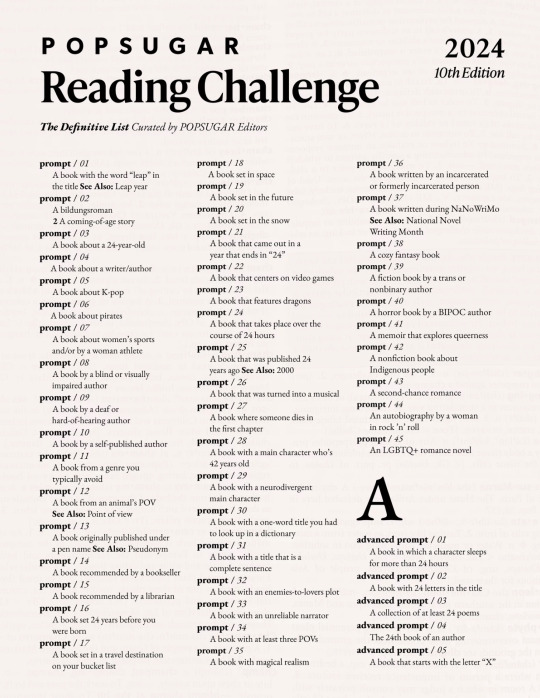
A book with the word "leap" in the title
A bildungsroman
A book about a 24-year-old
A book about a writer
A book about K-pop
A book about pirates
A book about women's sports and/or by a woman athlete
A book by a blind or visually impaired author
A book by a deaf or hard-of-hearing author
A book by a self-published author
A book from a genre you typically avoid
A book from an animal's POV
A book originally published under a pen name
A book recommended by a bookseller
A book recommended by a librarian
A book set 24 years before you were born
A book set in a travel destination on your bucket list
A book set in space
A book set in the future
A book set in the snow
A book that came out in a year that ends with "24"
A book that centers on video games
A book that features dragons
A book that takes place over the course of 24 hours
A book that was published 24 years ago
A book that was turned into a musical
A book where someone dies in the first chapter
A book with a main character who's 42 years old
A book with a neurodivergent main character
A book with a one-word title you had to look up in a dictionary
A book with a title that is a complete sentence
A book with an enemies-to-lovers plot
A book with an unreliable narrator
A book with at least three POVs
A book with magical realism
A book written by an incarcerated or formerly incarcerated person
A book written during NaNoWriMo
A cozy fantasy book
A fiction book by a trans or nonbinary author
A horror book by a BIPOC author
A memoir that explores queerness
A nonfiction book about Indigenous people
A second-chance romance
An autobiography by a woman in rock 'n' roll
An LGBTQ+ romance novel
Advanced Prompts
A book in which a character sleeps for more than 24 hours
A book with 24 letters in the title
A collection of at least 24 poems
The 24th book of an author
A book that starts with the letter "X"
#popsugar reading challenge#popsugar reading challenge 2024#reading challenge#books#booklr#reading#bookish#bibliophile#book prompts#book challenge#book club#literature#tbr list#nanowrimo
121 notes
·
View notes
Text
my favorite free tools for writers
hello, hello! hope you're doing well.
today i am bringing you another list with my top 3 favorite (free!) tools that I find helpful for each phase of writing a novel.
brainstorming phase
Fantasy Names Generator - not only for fantasy (you can also generate real names). this website is just... amazing! it helps you come up with names for characters, places and locations, descriptions, generate traits, outfits (yes, outfits!!), and probably something else you could ever think of.
The Story's Hack - this one is so cool! you can generate names for everything, create your own generator, and practice writing through writing exercises! plus, you can save your generated names to see later, and you earn coins for each idea generated (you can later buy themes - dark, snow, forest, etc)
RanGen - my last favorite generator on this list is RanGen! you can generate plots, appearances, archetypes, love interests, cities, worlds, items, and more.
developing the idea phase
Bryn Donovan - in this blog you can find master lists under the tag "master lists for writers". it is so helpful when you first start developing the characters and need to find the right words to describe them and to find some quirks and flaws!
Writers Write (350 character traits) - again, this is so helpful!
Story Planner - ah, the number of times I've talked about this website... please, PLEASE take a look at it, you won't regret it. this website has literally everything you need to fully develop your idea with outlines for you to fill in step by step.
writing phase
Colleen Houck (80+ barriers to love) - need more romace conflict? there you go!
Cheat Sheets for Writing Body Language - so, you know how your character's feeling, but don't know how he'd physically act? check out this list!
Describing Words - honestly, this is a lifesaver. don't you struggle to find the right word to describe something? well, with this website all you have to do is to type the object you're trying to describe and see which description fits better to you!
revising phase
Language Tool for Google Docs - i know we all have heard about google docs before, but the truth is, it's almost impossible to find free softwares to check grammar and spelling. so, google docs is useful, because it automatically revises it for us, and it's completely free. plus, you can add adds-on, such as "language tool".
Unfortunately, there's only one (free) tool that I actually enjoy for the revising phase. if you know some others, please let me know so that I can try them out and feature in this list.
exporting phase
Google Docs - i find google docs very easy to format and export to .epub, so i'd recommend using it as a free tool.
Reedsy - this is also a free tool available online. all you have to do is to write down each chapter (copy and paste) or import your word document. it will format the document to your liking and export it to pdf, epub and mobi.
that's everything for now! i hope this post was somehow helpful or inspiring!
if you want to see more master lists full of resources, check these:
WEBSITES FOR WRITERS {masterpost}
BEST accounts to follow as a writer
BEST SITES & SOFTWARES TO WRITE FICTION
DIALOGUE IDEAS TO GET RID OF THAT WRITING BLOCK (masterpost)
Useful Resources & Tips for Writers
also, if you are a notion lover just like me, check the free template I just released with everything you need to develop and write your novel!
thank you so much for reading! hope to see you around, and have a nice day <3
#writing resources#writing#writeblr#writer tips#writing advice#writing help#writing tips#poetsandwriters#resources#research#wattpad#nanowrimo#creative writing#writerscommunity#writers#writing inspiration#writing prompts#writing reference#writerslife#writersofinstagram#software#inspiration#writing inspo#for writing#for writers#for whoever needs it#writing research#researching#we love an useful post#useful
6K notes
·
View notes
Text
Wednesday, November 1.
NaNoWriMo.
As one door closes, another door opens. So if you are feeling a little glum, a little blue, a little crestfallen this morning, as you pack your coffins, drone-controlled ghouls, pumpkins, and Normal Human Man costumes into the attic for another year, fear not. Because the passing of October 31st can only mean the arrival of November 1st. And the arrival of this date will be exciting and daunting news for y'all in Tumblr's writing community—it's #nanowrimo.
Keyboards, touchscreens, typewriters, pens, and quills at the ready, folks. You've got 30 days to do 50,000 words. They are not going to write themselves.
Good luck x

#today on tumblr#writblr#art#artists on tumblr#writers on tumblr#nanowrimo#nano 2023#nanowrimo 2023#nanowrimo prep#nanowrimo tips#writers of tumblr#national novel writing month#writerblr#writing community#nanowrimo23#writing#writers#writing prompt#creative writing#writing inspiration#my writing#on writing#writer#writers block#writeblr#writing tips#writing advice
913 notes
·
View notes
Text
tips for setting the scene
it’s easy to get caught up in dialogue or a character’s internal dialogue and forget altogether that they, too, exist in their own physical world. as authors, it’s primarily our job to convey the exact amount of information: the reader is on a need to know basis, but they also need to know enough to draw their own conclusions. i’ll admit, it’s a difficult task, but here are some tips to help set a scene:
- imagine the world from the eyes of your character: how do they see things? do they see the big picture first or are they drawn to smaller details that others don’t often notice? what’s pulling their attention away from the action or their own thoughts?
- breathe life into your scenes: i don’t mean the english teacher’s equivalent of “the curtains were blue means that the character is sad.” i’m talking about the blue filter in Twilight that conveys the “constant cover of clouds and rain” and the shift from the Arizona desert to the cool Pacific Northwest. think about all the small details that convey information about a scene and allow the readers to make inferences. if the character walks along a street and the yards shift from overgrown hedges with frayed yard chairs and a birdbath containing a mini swamp to yards with freshly cut grass with white picket fences and ornate wreathes hanging on the doors, you’re providing all of the details for readers to make an inference. context is needed, too, but that will be provided in the whole of your novel or short story. don’t be afraid to provide details and use figurative language.
- spread out your details: did you feel bombarded in the last tip? i provided a lot of details quickly, all at once, without spreading them between action, dialogue, or internal dialogue. i’m not going to stop you from being the next J.R.R. Tolkien if that’s how you like to write, but try not to overwhelm the reader with details all at once. it will feel more natural if you spread things out and allow the reader to feel as if they, too, are with the character in their environment. this is more of a stylistic tip, so take it with a grain of salt and think about what will work best for your novel. always go back to that and to what your character is seeing. how is this all playing out for them? how can you put feeling into the scene?
- place your characters within the scene: where are they in their environment? how are they interacting with the people or objects in it? what do they think about these things? you don’t need to tell the reader everything your character does, but provide enough information so that we don’t get lost in their movement or stagnation. it helps to have someone else read your work if you’re struggling with this part. if they’re lost as to where the character is or what they’re doing, chances are a good portion of your readers will be confused, too. check out your prepositions. are there too many? too few? use them, but don’t abuse them.
happy writing! if you need help setting a scene or have any questions, our ask box is always open!
#writing advice#writeblr#writing#writing tips#write it#nanowrimo#novel writing#creative writing#writers block#writing help#writing prompts#writing warm up#writers on tumblr#books and novels#writing tools#fiction#writers of tumblr#fiction writing#novel editing service
3K notes
·
View notes
Text
Quick, everybody reblog with a summary of your nanowrimo project consisting of JUST one (1) sentence and five (5) emojis GO
134 notes
·
View notes
Text
Today in "Where Do You Get Your Ideas?" I have tried to write "hearing aids," but wrote "herring aids" instead.
Now that's several stories in one.
Maybe they're Babelfish things that you stick in your ear so they can whisper to you all the sounds you have trouble hearing on your own?
Cochlear implants for fish?
Something else?
#writing prompts#fun with typos#'where do you get your ideas?'#today from typos#and I am fascinated by the implications#writer life#NaNoWriMo
139 notes
·
View notes
Text
okay i did this poll already i know but I wanted to see if the results change after doing it for a week so.... (redo) poll time!
what genres do you find yourself writing in unintentionally? like what do you gravitate to whenever you start a story?
also, quick notes: if i didn't include a genre, rb and put it in the tags. (i didnt include fanfiction because i feel like most fanfic also fits into these genres)
if u want, rb so there's a higher sample size
#writing poll#poll#tumblr polls#writeblr#writers of tumblr#writers#creative writing#writing prompts#poll time#writer things#story telling#fiction#tumblr writers#nanowrimo#writing prompt
96 notes
·
View notes